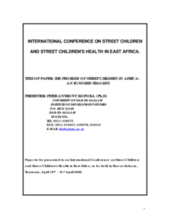The twenty-first century presents a hostile face to many millions of children in many African countries. An increasing number of children are being forced to the streets as result of poverty, abuse, torture, rape abandonment or orphaned by AIDS. Human rights violations against children in the 1990s have become a common and disturbing occurrence in many African countries. Denial of basic human and legal rights including the right to life, liberty and security as a person to children are now a defining feature of the African socio-economic landscape.
This paper examines Africa's response to the growing problem of street children. Taking Tanzania as a case study the paper examines initiatives that have been and are being taken by various segments of the community to address the problem of street children. What kinds of policies and strategies are African governments putting in place, what is the family and community doing? For instance, to what extent are families, schools and individual members of society dealing with the problem? How is the government dealing with the increasing numbers of unsupervised children living alone in urban streets? What role can Non-Government Organizations (NGOs) and community-based organizations play in addressing the problem of street children?
We contend that the problem of street children remains an ignored tragedy and is set to have a devastating impact on the development of African counties. The paper indicates that the response to the problem has at best been muted and remains ignored or sidelined by the government and the general public. Key players who are supposed to play a leading role in finding a solution to the problem have become the major source of the problem. Government policies that embrace liberalization and the free market economy are contributory factors to the persistent state of poverty and increased hardship with children being affected most. The family, which is supposed to be the bedrock of children's welfare and protection, is today becoming a major cause of the problem of street children. Parents are sending their children into the streets to beg, steal or engage in petty trade, children are leaving their homes to escape domestic violence or because of the breaking up of family structures. Schools are turning into centers of violence and crime and creating an environment to puts more children on the streets.
Furthermore, we contend that government policies directed by structural adjustment programmes are responsible for putting more and more children on to the streets as a result of increasing poverty instead of devising policies that will ensure the welfare of children and the society in general. The general public pretends not to notice the plight of an increasing number of destitute children on our streets. There is at present no real alarm or outrage from the general public on the increasing number of children on our streets even though these children face starvation, are at the mercy of unscrupulous individuals and a brutal police force.
The government and the community in general need to put in place viable policies or strategies that will ensure that the plight of street children is urgently addressed. The paper contributes to this task by exploring means and ways that the government and the community at large can play in solving the problem of street children in Africa and Tanzania in particular.
©Institute of Development Studies, University of Dar es Salaam, Tanzania

